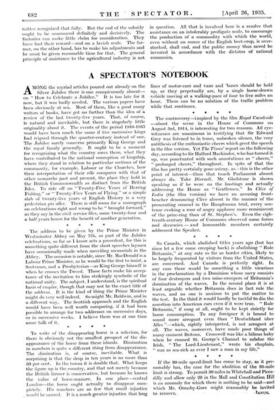The controversy—inspired by the film Royal Cavalcade -about the scene
in the House of Commons on August 3rd, -1914, is interesting for two reasons: Ail eye- witnesses are unanimous in testifying that Sir Edward Grey was listened to in tense, unbroken silence, the very antithesis of the enthusiastic cheers which greet the speech in the film version. Yet The Times' report on the following day, according to Sir Halford Mackinder, who has turned it up, was punctuated with such annotations as " cheers," " prolonged cheers," throughout. In spite of that the film has pretty certainly gone astray, as—this is the other point of interest—films that touch Parliament almost alWays do. Take Disraeli. Mr. Gladstone is shown speaking as if he were on the hustings and actually addressing the House as " Gentlemen." In Clive of India (the film version) we have an accusing front- bencher denouncing Clive almost in the manner of the prosecuting counsel in the Hauptmann trial, every sen- tense evoking a roar of angry applause more reminiscent of the prize-ring than of St. Stephen's. Even the eigh- teenth-century House of Commons observed some forms and decencies — and honourable members certainly addressed the Speaker.










































 Previous page
Previous page